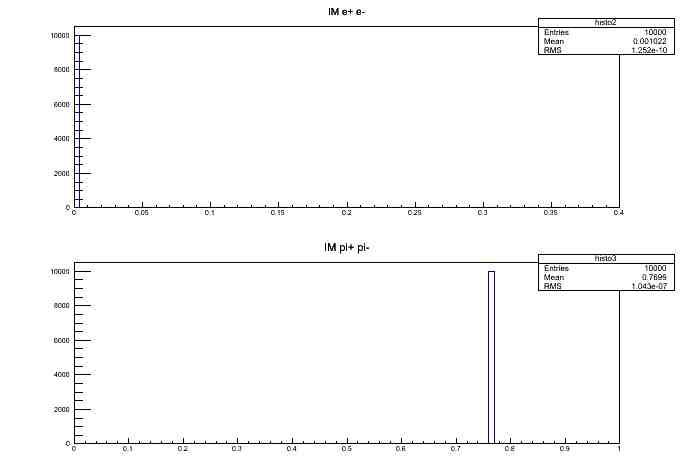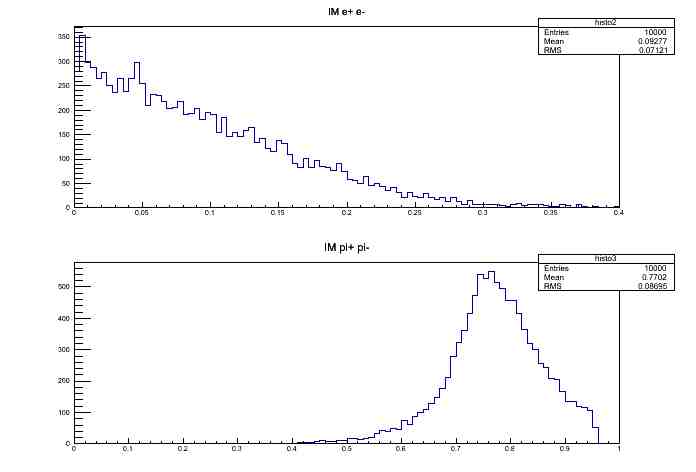Home » Hades » Pluto » [SOLVED]Eta Prime decay via rho dilepton
| [SOLVED]Eta Prime decay via rho dilepton [message #15355] |
Mon, 26 August 2013 00:14  |
 Michael Kunkel
Michael Kunkel
Messages: 53
Registered: June 2011
|
continuous participant |
From: *hr.hr.cox.net
|
|
Greetings,
I am trying to simulate the reaction g + p -> p eta'; eta'->rho dilepton; rho->pi+ pi-.
When I do this I have to set a PInclusiveModel for the dilepton, or there is no distribution. Here is a plot without setting a PInclusiveModel. 
The problem is when setting this PInclusiveModel, the invariant mass of pi+pi- is not longer rho but instead a distribution.

Here is a working code.
//#include "loadPluto.h";
//Author Michael C. Kunkel
#include "TH1.h"
#include "TH2.h"
#include "TH3.h"
#include "TChain.h"
#include "TCanvas.h"
#include "TF1.h"
#include "/Users/Mike/Pluto/pluto_v5.42/src/PParticle.h"
#include "/Users/Mike/Pluto/pluto_v5.42/src/PReaction.h"
#include "/Users/Mike/Pluto/pluto_v5.42/src/PBeamSmearing.h"
#include "/Users/Mike/Pluto/pluto_v5.42/src/PAnyDistribution.h"
void SIMULATE_EtaPrime_Dalitz(){
makeStaticData()->AddDecay(-1, "eta' -> rho0 + dilepton ", "eta'", "rho0,dilepton",0.0009);
//TF1 object representing the di-lepton statistics:
TF1 *flat = new TF1("flat","1",0,1);
//The "PInclusiveModel" can be used as a generator:
PInclusiveModel *dilepton_generator = new PInclusiveModel("flat@eta'_to_rho0_dilepton/generator","Dilepton generator",-1);
//The distribution template:
dilepton_generator->Add("eta',parent");
dilepton_generator->Add("rho0,daughter");
dilepton_generator->Add("dilepton,daughter,primary");
dilepton_generator->SetSampleFunction(flat);
//Enable distribution as a generator
//dilepton_generator->EnableGenerator();
makeDistributionManager()->Add(dilepton_generator);
double ebeam_min = 1.1725;
double ebeam_max = 5.44575;
PBeamSmearing *beam_smear = new PBeamSmearing("beam_smear", "Beam smearing");
TF1* beam_smear_fn = new TF1("beam_smear_fn", "1./x", ebeam_min, ebeam_max);
beam_smear->SetReaction("g + p");
beam_smear->SetMomentumFunction(beam_smear_fn);
makeDistributionManager()->Add(beam_smear);
gROOT->Reset();
//PUtils::SetSeed(123); //this is to have a fixed SEED. By default, the systime is used....
PReaction my_reaction("_P1 = 2.2","g","p","p eta' [dilepton [e+ e-] rho0 [pi+ pi-]]","etaP_Aphi",1,0,1,1);
TH1F * histo2 = new TH1F ("histo2","IM e+ e-",100,0.0,0.4);
TH1F * histo3 = new TH1F ("histo3","IM pi+ pi-",100,0.0,1);
my_reaction.Preheating(100);
my_reaction.Do(histo2,"_w =1;_x = ([dilepton])->M() ");
my_reaction.Do(histo3,"_w =1;_x = ([pi+] + [pi-])->M() ");
my_reaction.Loop(10000);
TCanvas *c1 = new TCanvas("c1","c1");
c1->Divide(1,2);
c1->cd(1);
histo2->Draw();
c1->cd(2);
histo3->Draw();
c1->Print("mass_spectrum.jpeg");
}
[Updated on: Mon, 26 August 2013 01:19] Report message to a moderator |
|
|
|
| Re: Eta Prime decay via rho dilepton [message #15356 is a reply to message #15355] |
Mon, 26 August 2013 01:17   |
 Michael Kunkel
Michael Kunkel
Messages: 53
Registered: June 2011
|
continuous participant |
From: *hr.hr.cox.net
|
|
I worked around it by
//#include "loadPluto.h";
//Author Michael C. Kunkel
#include "TH1.h"
#include "TH2.h"
#include "TH3.h"
#include "TChain.h"
#include "TCanvas.h"
#include "TF1.h"
#include "/Users/Mike/Pluto/pluto_v5.42/src/PParticle.h"
#include "/Users/Mike/Pluto/pluto_v5.42/src/PReaction.h"
#include "/Users/Mike/Pluto/pluto_v5.42/src/PBeamSmearing.h"
#include "/Users/Mike/Pluto/pluto_v5.42/src/PAnyDistribution.h"
void SIMULATE_EtaPrime_Dalitz(){
Double_t m_rho = makeStaticData()->GetParticleMass("rho0");
makeStaticData()->AddParticle(-1,"X", m_rho);
makeStaticData()->AddDecay(-1,"X -> pi+ + pi=", "X", "pi+,pi-", 1.);
//makeStaticData()->AddDecay(-1, "eta' -> rho0 + dilepton ", "eta'", "rho0,dilepton",0.0009);
makeStaticData()->AddDecay(-1, "eta' -> X + dilepton ", "eta'", "X,dilepton",0.0009);
//TF1 object representing the di-lepton statistics:
TF1 *flat = new TF1("flat","1",0,1);
//The "PInclusiveModel" can be used as a generator:
PInclusiveModel *dilepton_generator = new PInclusiveModel("flat@eta'_to_rho0_dilepton/generator","Dilepton generator",-1);
//The distribution template:
dilepton_generator->Add("eta',parent");
dilepton_generator->Add("X,daughter");
dilepton_generator->Add("dilepton,daughter,primary");
dilepton_generator->SetSampleFunction(flat);
//Enable distribution as a generator
//dilepton_generator->EnableGenerator();
makeDistributionManager()->Add(dilepton_generator);
double ebeam_min = 1.1725;
double ebeam_max = 5.44575;
PBeamSmearing *beam_smear = new PBeamSmearing("beam_smear", "Beam smearing");
TF1* beam_smear_fn = new TF1("beam_smear_fn", "1./x", ebeam_min, ebeam_max);
beam_smear->SetReaction("g + p");
beam_smear->SetMomentumFunction(beam_smear_fn);
makeDistributionManager()->Add(beam_smear);
gROOT->Reset();
//PUtils::SetSeed(123); //this is to have a fixed SEED. By default, the systime is used....
PReaction my_reaction("_P1 = 2.2","g","p","p eta' [dilepton [e+ e-] X [pi+ pi-]]","etaP_Aphi",1,0,1,1);
TH1F * histo2 = new TH1F ("histo2","IM e+ e-",100,0.0,0.4);
TH1F * histo3 = new TH1F ("histo3","IM pi+ pi-",100,0.0,1);
my_reaction.Preheating(100);
my_reaction.Do(histo2,"_w =1;_x = ([dilepton])->M() ");
my_reaction.Do(histo3,"_w =1;_x = ([pi+] + [pi-])->M() ");
my_reaction.Loop(10000);
TCanvas *c1 = new TCanvas("c1","c1");
c1->Divide(1,2);
c1->cd(1);
histo2->Draw();
c1->cd(2);
histo3->Draw();
c1->Print("mass_spectrum_nodilep_dist.jpeg");
}
|
|
|
|
| Re: [SOLVED]Eta Prime decay via rho dilepton [message #15369 is a reply to message #15355] |
Wed, 28 August 2013 11:49  |
 Ingo Froehlich
Ingo Froehlich
Messages: 167
Registered: March 2004
Location: IKF - Frankfurt
|
first-grade participant |
From: *dip0.t-ipconnect.de
|
|
I don't think that we have a model for eta' -> dilepton + rho0 in hand. If you use a "generator" model for the dilepton, it does not use the M1-model for Breit-Wigner-sampling of the daughter, but a fixed mass.
PS: if you use "/generator", it does not use the PInclusiveModel as a primary one. Pluto might be confused about this. "/generator" is normally used together with a primary model in weighting mode.
--
Ingo Froehlich
IKF - University of Frankfurt
069-798-47027, FAX: -47024
|
|
|
|
Goto Forum:
Current Time: Fri Jul 04 13:50:20 CEST 2025
Total time taken to generate the page: 0.00767 seconds
|
 GSI Forum
GSI Forum


